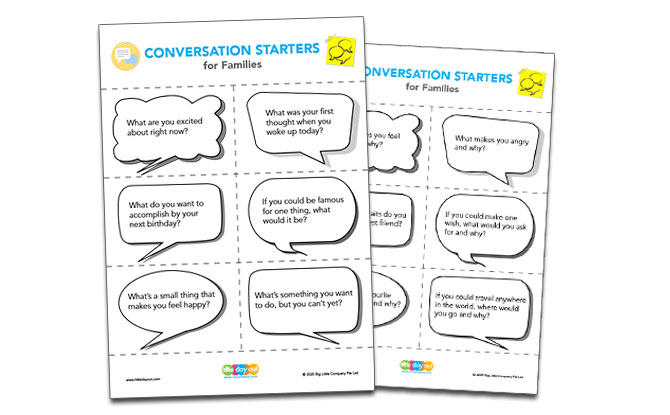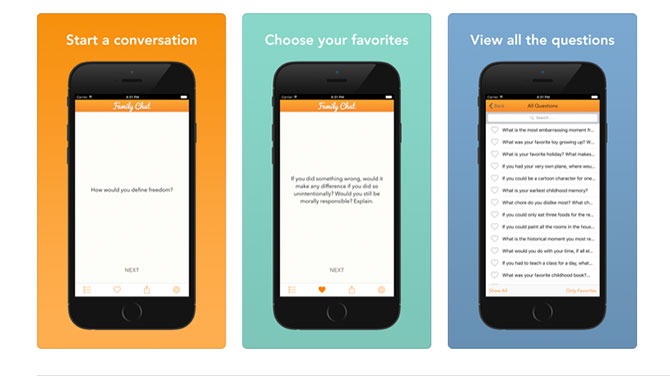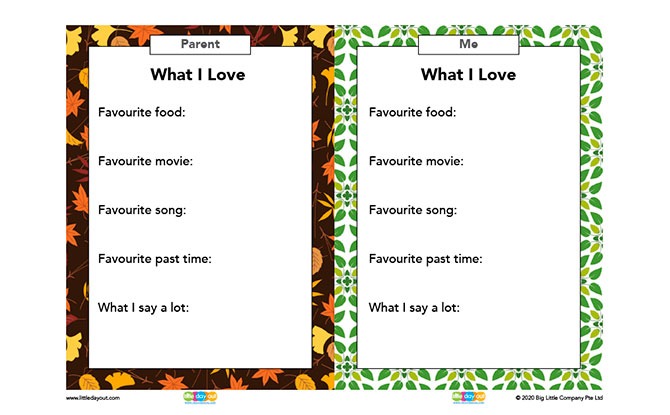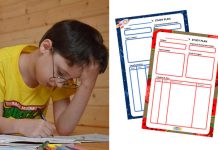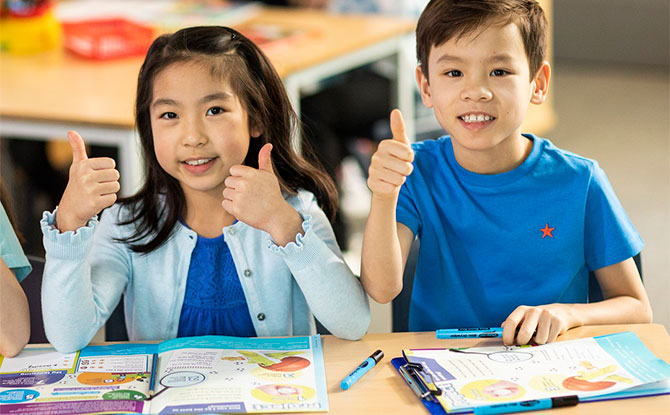
It’s frustrating when a conversation ends before it even gets started. Are you looking to go beyond “How was your day?” with your kids – and the one-word answers the question invariably elicits?
Good news – there’s no need to wrack your brains to come up with novel conversation topics. Whether you have preschoolers, teenagers or in-betweens, check out these great ways that will help you start and maintain great conversations with them.
Ways to Initiate Awesome Conversations with Kids
1. Question Cards
We prefer our conversation starters in a deck with one question per card rather than as a list. It’s just less intimidating, and it lends itself more easily to kids being able to pick a question or two to ask or answer each time. Keep them handy on the dining table, in the car or in your bag for a connection boost anytime.
If you’re into home-made, you can download our free conversation starter cards. Print it out on some cardstock, cut along the dotted lines and voila you’ll have a rudimentary deck of question cards to get you started.
If you prefer something fancier though, you’ll be spoilt for choice with the range of family conversation starter cards available on the market, from this award-winning portable series to this stylish set of 150 open-ended questions that wouldn’t look out of place amidst your minimalist decor.
2. Conversation Starter Apps
Although it’s generally a good idea to turn off your technology when attempting to engage your kids, using your device to access conversation starter apps might prove to be an exception, particularly when you want to connect on the go. There are a variety of free and paid conversation apps available for both Android and iOS devices.
Examples of free apps include Conversation Shaker (iOS) and Beyond Small Talk (iOS & Android), though the free versions are the “lite” ones with a limited number of questions. They’re also not written specifically with families in mind so not all the questions are child-friendly. You’ll have to screen the questions before use.
Apps written for specifically for families with young children include Make Every Day Count (free, for iOS and Android) and Family Chat Conversation Topics (paid, for iOS). The former is released by a Focus on the Family, a Christian organization and includes questions pertaining to the Christian faith, although you can easily filter questions by category to exclude those if you prefer. We like that the questions on this app can also be tailored to the gender and age of your child.
Family Chat Conversation Topics has a bank of 200 questions, suitable for ages 4 and up, which are randomly presented for discussion, one at a time. Some are serious and some are not. Most are thought provoking. Kids will love “shaking” the device for the next question.
3. Conversation Starter Placemats
Given how mealtimes are ideal for unfettered conversation, keeping a box or bowl or conversation starters on the dining table is always a good idea. How about a creative twist on this?
We’ve all seen learning placemats that keep your kids learning everything from math to geography during mealtimes. Why not conversation starter placemats that’ll keep your family dinners lively and full of well…conversation?
You could easily make your own conversation starter placemats by laminating A3 sheets of your own conversation starter questions. But if you’re not quite feeling up the task, you could also plump for this set of 24 different tear-out paper placemats bearing 375 questions and icebreakers to help your family get to know one another better.
4. Interactive Journals
Who says conversations have to be verbal? For many kids – and more than a fair share of parents, we suspect – writing may be the preferred form of expression.
If you have one of those kids, take the conversation onto paper. Use conversation prompts to write notes to your child, and have them respond in their own time. Try using a simple template like this free downloadable parent-child journal we’ve come up with.
Or you can take things up a notch with a purpose-designed conversation journal that will guide the dialogue and hold the back-and-forth safely all in one place. There are journals tailored for mother-and-son, mother-and-daughter, father-and-son, father-and-daughter, and even for grandma and grandpa to get in on the conversation. Your kids will obviously have to be old enough to read and write, but there are journals tailored for teens and those more suited for younger kids.
One bonus of having a written conversation is that it can be captured for posterity. How precious it’d be to be able to re-read the conversations a little further down the road when the kids are older. Interactive journals would make excellent gifts for Mother’s or Father’s Day!
5. Book and Movies
Almost any story your child reads or watches can be used as a springboard point for potentially deep conversations. Reading or listening through the audio version of a book or series together with your child or holding a family movie night can be a great way to bond. Talk to them about the book or movie after – about what they liked or didn’t about the book or movie or which characters they identified with or what they would have done differently, for example.
Even if you can’t quite keep up with your kids’ pace, here’s a tip: media review sites like Common Sense Media (books and movies), Kids-In-Mind (movies), Parent Previews (movies) and Compass Book Ratings (books) not only provide book and movie synopses and ratings, but highlight the key themes present and provide helpful conversation pointers relating to them. These sites can also be great resources to identify media that might help you bring up particular topics of conversation with your child.
So there you have it. With some of these in your pocket, it’s not so hard to start good conversations at home, is it?
This story contains affiliate links. This means we earn a small fee if you purchase something through a link from our website. There is no additional cost to you. This helps to support Little Day Out and keeps us going.


